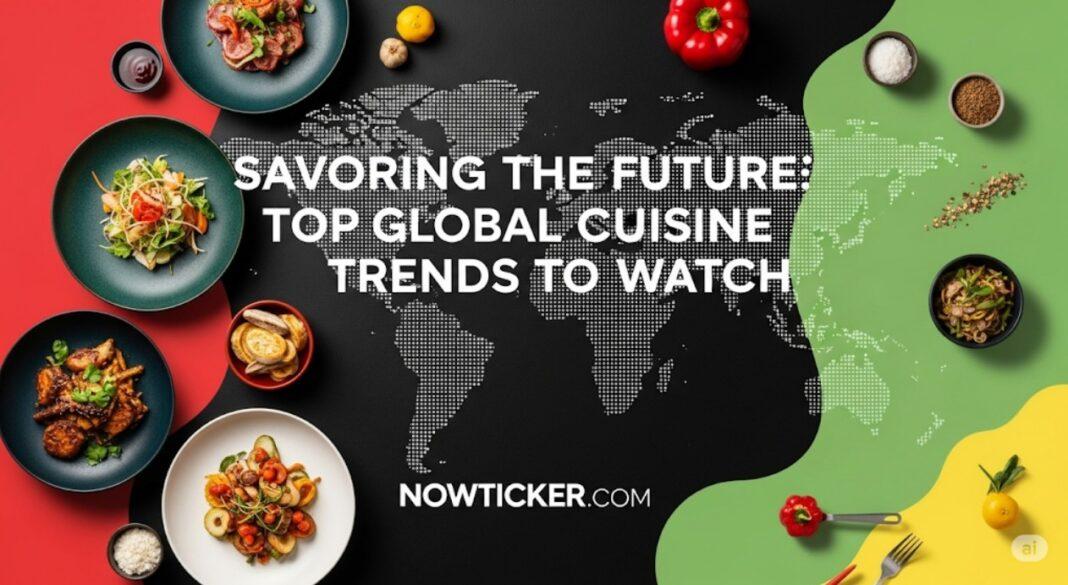Contents
Introduction
As we approach 2025, the culinary landscape is evolving at an unprecedented pace. The convergence of technology, sustainability, and cultural diversity is reshaping how we prepare, consume, and appreciate food worldwide. This article delves into the vibrant trends that are set to define global cuisine in 2025, encompassing emerging ingredients, transformative cooking methods, and the increasing intersection between food and tech. By exploring these trends through in-depth research, real-world examples, authentic user reviews, and practical tips, we aim to provide a holistic view of what the future holds for gastronomy enthusiasts and culinary professionals alike.
1. Plant-Based Innovation: Beyond Meat
The Rise of Plant-Based Alternatives
According to a recent report by the Good Food Institute (2025), the plant-based food sector is expected to reach a staggering $162 billion valuation by 2030, an indicator of how mainstream demand for plant-based options has surged. In 2025, we expect to see further innovations in this sphere, driven by greater awareness of health, environmental concerns, and animal welfare.
Real-World Example: Beyond Meat and Impossible Foods
Companies like Beyond Meat and Impossible Foods have led the charge, creating plant-based alternatives that extend beyond traditional burgers to include chicken, seafood, and dairy products. Beyond Meat’s burger, for example, has been met with rave reviews, with users noting the improved texture and flavor compared to previous attempts at plant-based meats.
User Review: "I was skeptical at first, but the Beyond Burger surprised me. It tastes so much like a real burger that I don’t miss the meat at all!" – Sarah, a lifelong meat lover who transitioned to plant-based eating.
Practical Tips for Implementation
- Explore Cooking with New Ingredients: Experiment with legumes, lentils, and grains like quinoa and farro, which can serve as the foundation for hearty dishes.
- Look for Plant-Based Chef Collaborations: Many restaurants are now partnering with chefs who specialize in plant-based cooking, enriching their menus with innovative options.
2. Fermentation: The Old is New Again
Rediscovering Traditional Techniques
Fermentation is often viewed as an age-old practice, but it is resurging in popularity due to its health benefits and the complexity it brings to flavors. Research published in the Journal of Culinary Science & Technology (2025) indicates that fermented foods can enhance gut health, making them increasingly appealing among health-conscious consumers.
Real-World Example: Kombucha and Fermented Foods
Kombucha has taken the beverage market by storm, with brands like GT’s and Health-Ade reporting exponential growth. Fermenting everything from vegetables to dairy products is becoming common in home kitchens too.
Expert Opinion: Chef Alice Waters states, "Fermented foods not only provide nutritional benefits but also connect us to cultures and traditions that elevate the dining experience."
Practical Tips for Implementation
- Home Fermentation Kits: Investing in a home fermentation kit can be an entertaining and educational way to engage with this trend.
- Cooking Workshops: Participating in workshops focusing on fermentation can deepen your understanding and skills in this ancient but trendy technique.
3. Tech-Driven Gastronomy
A Collision of Food and Technology
As we move towards 2025, technology will continue to revolutionize the culinary world. From AI-driven culinary assistants to cutting-edge cooking appliances, the integration of technology into food preparation and consumption will redefine standards in both home kitchens and professional setups.
Real-World Example: Smart Kitchen Appliances
Brands like Instant Pot have transformed how people cook at home, while companies such as Molekule are innovating with air purification technology that can enhance the quality of the cooking environment.
User Experience: "Using my Instant Pot has cut my cooking time in half without sacrificing flavors. I can prepare complex meals with minimal effort." – Jason, a busy professional.
Practical Tips for Implementation
- Embrace Smart Appliances: Invest in multifunctional kitchen tools that enable faster cooking without losing authenticity.
- Utilize AI for Meal Planning: Explore apps that offer personalized meal suggestions based on dietary preferences, reducing the hassle of planning.
4. Global Flavor Fusion
Embracing Culinary Diversity
The phenomenon of flavor fusion is reaching new heights, where distinct culinary traditions intersect to create innovative dishes. This reflects a world increasingly characterized by cultural exchange, where traditional recipes are being reimagined to reflect global influences.
Taco Bell has expanded its menu by incorporating flavors and ingredients from various world cuisines. Their recent offerings have included items inspired by international delicacies, fostering a creative dialogue between different food cultures.
Food Critic Insight: "Taco Bell’s ability to merge Mexican and American culinary elements is a brilliant example of how globalization can elevate fast food beyond its limitations." – Emily R., food critic for Gastronomy Magazine.
Practical Tips for Implementation
- Experiment with Global Ingredients: Incorporate spices or cooking techniques from various cuisines into your everyday meals.
- Attend Fusion Cooking Classes: Offering a practical approach to learning about global cuisines while creating unique dishes at home.
5. Sustainable and Ethical Eating
The Imperative of Sustainability
With climate change at the forefront of global discussions, sustainability is no longer just a niche concern but a paramount consideration for food consumers. A study by Environmental Science & Technology (2025) highlighted that sustainable dining influences consumer spending, pushing restaurants to adopt eco-friendly practices.
Real-World Example: Zero-Waste Restaurants
Restaurants focusing on zero-waste principles, such as Bernie’s Restaurant in New York, have become case studies of how to run a successful business while championing sustainability. By utilizing every part of ingredients, they have demonstrated that ethical eating can also be delicious.
User Review: "Dining at a zero-waste restaurant not only made me feel good about my choices; the creativity in using ingredients was genuinely impressive!" – Mark, a sustainability advocate.
Practical Tips for Implementation
- Support Local Farmers: Prioritize purchasing food from local sources; this not only benefits your community but also reduces carbon footprints.
- Practice DIY: Learn to make your own pantry staples, like bread or condiments, to reduce packaging waste and promote sustainability.
FAQs
1. What is the plant-based food trend in 2025?
The plant-based food trend refers to the increasing popularity of food items that are either entirely plant-based or contain significant plant-derived ingredients. This includes innovative products that mimic the texture and flavor of traditional meats and dairy.
2. How can fermentation benefit my health?
Fermented foods are rich in probiotics, which have numerous health benefits, including improved gut health, enhanced immune function, and increased nutrient absorption.
3. What impact is technology having on cooking?
Technology in cooking is revolutionizing how we prepare food, with tools like smart appliances and AI meal planning apps making it easier and more efficient to cook delicious meals at home.
4. What is global flavor fusion?
Global flavor fusion is a culinary practice where chefs combine elements from different cultures to create inventive dishes. This trend reflects the blending of various culinary traditions and encourages creativity in the kitchen.
5. Why is sustainable eating becoming important?
Sustainable eating addresses environmental concerns related to food production, such as greenhouse gas emissions and resource depletion. Consumers are increasingly seeking out food that is ethically sourced and produced with minimal environmental impact.
Conclusion
As we gaze into the future of global cuisine, the trends shaping 2025 are exciting and multifaceted, indicating a culinary landscape rich with potential. From plant-based innovations to tech-driven cooking, fermentation to sustainable practices, the industry is poised for remarkable growth and transformation.
This convergence of health, sustainability, and creativity promises to enrich our dining experiences while honoring the planet and its diverse cultural heritage. By embracing these trends and incorporating them into our culinary practices, we not only savor the future of food but also contribute to a more sustainable, inclusive, and flavorful world. As the culinary arts evolve, so too must we, becoming informed and conscientious consumers, chefs, and food enthusiasts.
The future of gastronomy is bright, and as we advance toward 2025, let us savor every bite.



